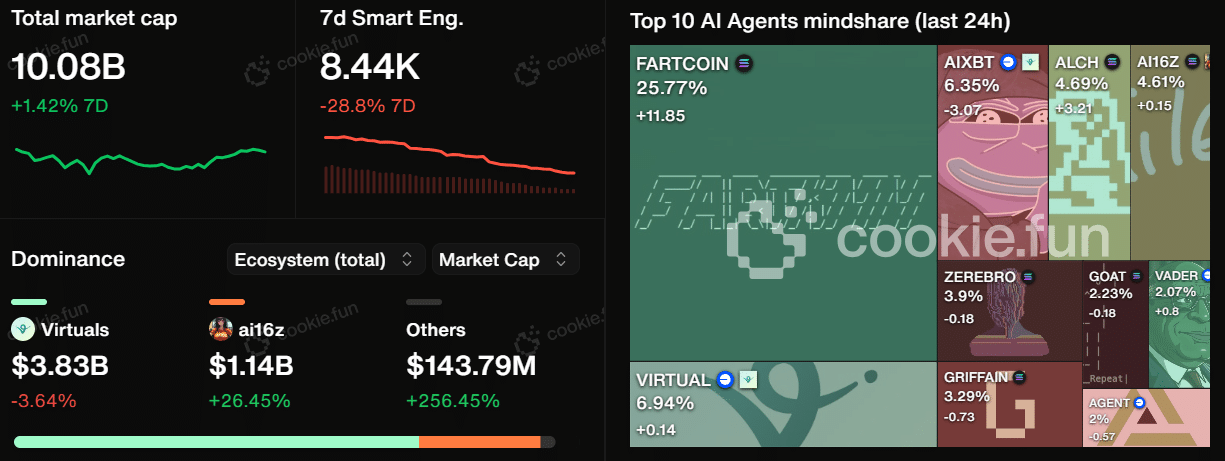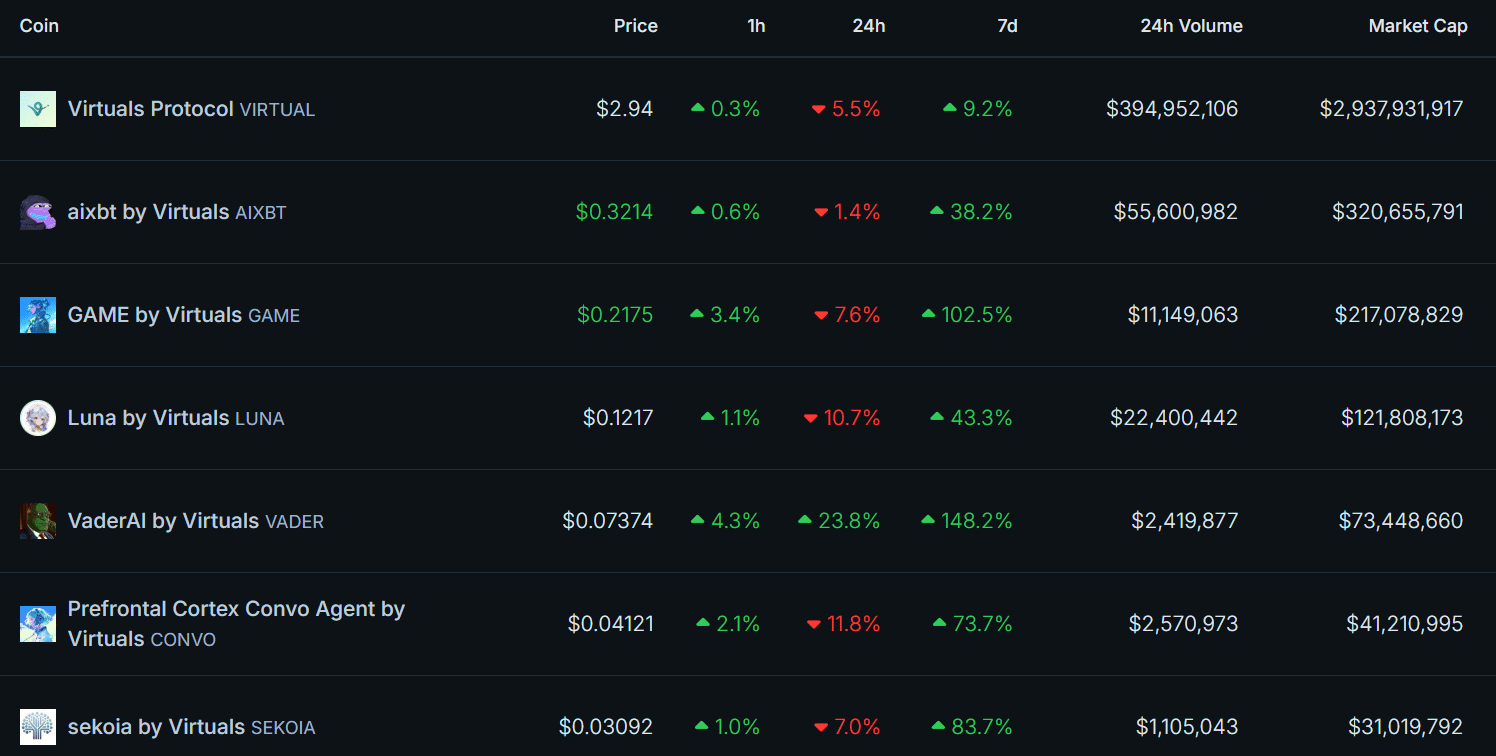- Virtual Protocol and ai16z’s Solana-based Eliza are the main AI agent launchpads and dominant players
- Despite a recent exploit, Spectral tops in on-chain AI agent trading, and agent commerce is set to grow in 2025
2024 has been the most impactful year for the AI agent narrative. What began as a viral exchange between A16z founder Marc Andreessen and an autonomous AI agent Truth Terminal, spawned the first-ever “agent millionaire” through the Goatseus Maximus [GOAT] memecoin.
GOAT’s viral success kicked off the AI agent trend. However, the trend quickly changed from memecoins to useful agents, thanks to Base’s Virtual Protocol, a co-ownership and launchpad for agents.
Now, nearly 12k agents have been launched on the Virtual protocol, with various uses, including trading, creating music, streaming, social media posts, investment, etc.
This has pumped the native token VIRTUAL to a unicorn status ($3B), underscoring the sector’s growth potential. Another AI agent launchpad, Solana’s Eliza, joined the race, cementing the narrative’s traction.
Industry experts remain bullish and expect an explosive growth in 2025. So, what’s the current status, and what should you look out for in 2025?
Virtual Protocol leads as ‘Agent Commerce’ takes shape
The top launchpads, VIRTUAL and Solana-based AI16z [AI16Z], the AI VC firm behind the Eliza framework, dominate the sector.
According to Cookie.fun data, the duo controls about half of the total market cap, which was about $10 billion at press time.


Source: Cookie.fun
The Virtual ecosystem has one of the most robust designs, tying new agents to the VIRTUAL token and driving value accrual.
Among its 12k agents, the top three, a Twitter alpha Aixbt [AIXBT], gaming agent Game [G.A.M.E], and social influencer Luna [LUNA], each have more than $100M in market cap.
Most analysts believe increased ecosystem traction could push VIRTUAL to a decacorn status ($10B market cap). That would translate to over 3x from its current $3B.


Source: Coingecko
But Solana’s Eliza could also gain massive ground, especially as ai16z mulls revamped tokenomics to boost its native token and the agent framework.
In an exclusive interview with AMBCrypto, James Wo, founder and CEO of digital asset investment firm Digital Finance Group (DFG), said that Eliza’s open-source popularity could make it a top contender. He said,
“Having many forks on the Eliza repository, it demonstrates the popularity of the Eliza stack and is another strong contender.”
From a chain perspective, the race is between Base and Solana for now, but new nuances may be emerging too.
Agent-to-agent commerce
Until recently, most engagements have been strictly between agents and humans. We recently witnessed the first-ever agent-to-agent commerce. Luna, an AI social influencer, paid Stix Protocol, an image generator, $1 for each piece made to drive her brand awareness.
Jansen Teng, Founder of Virtual Protocol, referred to the historic update as ‘agentFi’, marking the start of agents and humans co-existing and influencing each other.
Experts believe the agent commerce trend will pick up pace in 2025. According to Wo, chains like Mode Network are already leading with DeFi agents that drive activity such as lending and liquidity provision.
Similarly, Hyperliquid DEX allows users to deploy Spectral [SPEC], an AI trading agent on Virtual Protocol, to execute trades autonomously. In fact, SPEC has seen massive interest in the OTC (Over the Counter) space, attracting investment from players like Stix.
Part of the Stix’s statement read,
“We strongly believe that Spectral ($SPEC) will become the frontrunner and are proud to support the team with one of STIX’s largest investments in 2024.”
The firm added that recent updates from Spectral would firmly position it within the cycle’s major narratives.
“These developments are paramount in positioning Spectral at the centre of this cycle’s major narratives: Memecoins / AI Agents / Hyperliquid / Base.”
Now, although Spectral recently suffered an exploit that was later remedied, most analysts are still bullish, vouching for its lead in on-chain trading.
Other agents are also gaining traction in niche narratives, as summarized below.


DecentralisedCO
That being said, the space is rapidly expanding, and platforms that enable a decentralized AI agent economy, like Mode Network, are emerging. However, the agents could face data privacy issues and regulations.
Addressing this concern, Jorge António, CTO of Atoma Network, a decentralized network focused on privacy and verifiable AI inference, informed AMBCrypto of a privacy solution for agents. He said,
“Privacy and verifiability, as championed by Atoma, will play a crucial role, allowing agents to become more specialized and securely process sensitive data while ensuring transparency and trust.”
Antonio went on to add that with greater bot activity, verifying agent activity would improve its integrity and overall growth.
In conclusion, the AI agent narrative is concentrated in Base and Solana, led by Virtual Protocol and ai16z’s Eliza.
Some pundits believe Spectral could be a strong contender, given its idiosyncratic catalysts and early lead in on-chain AI agent trading. However, security and regulatory concerns will likely gain traction as agent commerce heats up in 2025.
Source: https://ambcrypto.com/rise-of-ai-agents-how-virtual-protocol-solana-could-lead-the-charge-in-2025/